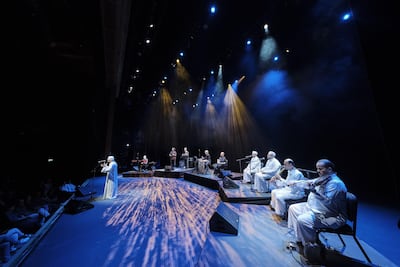Last September, Egyptian jazz maestro Fathy Salama and Sufi chanter Sheikh Mahmoud Tohamy performed a sold-out show at NYU Abu Dhabi.
The concert was a remarkable union of tradition and modernity, fusing contemporary Arabian jazz with the sounds and rhythms of Sufi chanting.
It was also an impressive display of the kind of music that has made Salama the only musician from the Arab world to win a Grammy Award.
And, if you missed the show, you can now watch it online on Wednesday, May 20, at 9.30pm – on a one-time-only basis as part of NYUAD Arts Centre’s Reconnect Series.
Euphoric and transcendental, Sufi chanting is traditionally seen as a way of experiencing and expressing love for the divine.
"In one way or another, Sufi music is very similar to jazz," says Salama, who is the founder of the Sharkiat jazz ensemble. "In jazz, you have a composition that acts only like a frame of work, which gives enormous space for improvisation."
Sufi music can be thought of the same way, he says, adding: “It’s not improvisation that comes out of nothing, but rather emerges from known traditions and education.”
Sufi chanting is often based on the works of Sufi poets such as Rumi and Hafez.
Its universal messages of peace, tolerance and love has also meant that the music has reached far beyond the borders of the Middle East and South Asia, where the practice originated.
While the music is steeped in tradition, it also has room for improvisation, which is what drew Salama to the discipline. He won the 2005 Grammy Award for Best Contemporary World Music Album with Youssou N'Dour for their album Egypt.

While he acknowledges the importance of developing musical traditions to adapt to the times, he also says there should always be those who seek to preserve classical traditions as they are.
“Education is extremely necessary to keep a healthy appreciation for classical styles. You need to study them to be able to develop them. In countries such as India, there are a great many schools that specialise in teaching classical Indian music, just as there are many who work on incorporating traditional approaches into contemporary music. We need more of that here in the Middle East," he says.
Looking to the future, Salama says the region should focus less on commercial music and more on musical education, if there are to be more Grammy Award winners.
To ensure this happens, Salama is teaching the next generation himself. He's currently spending his time in his Cairo home, weathering the pandemic. While he is considering performing live online shows for his fans, as other artists around the world have, he is more focused on mentoring young musicians.
“I’m working towards starting an online workshop to cater to students from all over the world," he says. "I’ve held a number of workshops around the world, and the format would be pretty much the same. I’ll be overseeing a group of students as they compose and produce a song in any genre from scratch.”


